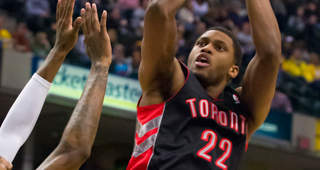Rudy Gay was a mesmerizing young talent out of Jim Calhoun’s UConn program, and sometimes teammates would ask him if his defender was troubling on a certain night. Gay constantly responded the same way: Don’t credit the defender, it’s solely my fault. It was his way of maintaining an edge, maintaining confidence when he missed shots.
This belief delivered him as a 20-point scorer in his second NBA season, and Gay had taken the projection of Carmelo Anthony before him, Kevin Durant after him. Pure scoring. A smooth, mechanically sound jump shot. Boundless athleticism. Gay always possessed the tools – crafted under Calhoun – and tremendous strength at 6-foot-8.
Gay reached a peak three seasons ago, and at 27 now he hasn’t attained the individual or team milestones that his gifts were expected to bestow. Three games into the Toronto Raptors’ season, his shooting is pedestrian and he admits he’s hastily searching for an offensive rhythm.
Over the summer, Jerry Colangelo inquired with Gay about the possibility of returning to USA Basketball for a minicamp compiled of guys mostly in their early twenties. As much as anything, the Team USA architect was offering Gay an opportunity to surround himself again with hungry, aspiring players.
Gay had considered Colangelo’s call, his invitation, to participate in the program with which he played a reserve role in the gold medal of the 2010 World Championships, but he ultimately declined.
“Mr. Colangelo respected that I couldn’t be involved with it this summer because I had a lot of things going on in the summer,” Gay told RealGM. “I still want to be part of USA Basketball, part of the experience. Of course.”
As a final cut of the Olympic team in 2012, Gay had came so close to placing himself on a grand stage around all these stars – Anthony and Durant and, yes, LeBron James. In some ways, the July experience could have allowed Gay to cultivate an in with Team USA officials, in a summer Paul George, Gordon Hayward and Harrison Barnes used wisely.
From the summer to the new season, Gay understood the looming pressures of lifting the Raptors into the playoffs. That’s the expectation his arrival in late January brought, and Toronto closed last season going 18-18. Gay missed 10 of 14 shots for 18 points in Saturday’s 97-90 win over the Milwaukee Bucks, but he grabbed a career-high 15 rebounds.
Gay believed his accuracy in shooting would be boosted, his life beyond the court clearer, by a procedure on his eyes in the offseason. They had deteriorated severely in recent years and bothered him away from basketball, so surgery proved to be a no-brainer.
“The procedure was something that had to be done,” Gay told RealGM. “Not just for basketball purposes, but for living. You got to see when you’re driving, and see all the little things in life and see your kids right.”
On his early struggles with his jumper, Gay sighed.
“I’m just trying not to be one-dimensional,” Gay said. “I can’t remember the last time I made a shot. … My shot’s not falling, and I want to make efforts on defense and on the rebounding glass.”
The Raptors have become a heavy jump shooting team with Gay and DeMar DeRozan initiating most of their offensive sets in isolations or screen plays. In what will assuredly be the last season of his contract, it’s clear Gay will continue to be in tireless speculation. Dwane Casey, for his part, remains a hard charging, pushing coach – no matter how uneven a situation he’s been dealt in previous spots (Minnesota), too.
In his mind, Casey knows the Raptors will go as far as the streaks of Gay and DeRozan, and that means they’ll be as high as the bottom half of a treacherous, top-heavy Eastern Conference playoff bracket. “For us to win, [Gay] and DeMar both have to playmakers – as well as scorers,” Casey said.
After taking the Raptors’ lead management job, Masai Ujiri made sharp signings to add depth and youth, including Dwight Buycks, Julyan Stone and Tyler Hansbrough. These Raptors should compete for a playoff seed; yet they’re firmly planted in the dreaded middle ground of the NBA, a non-contender as constructed that’s also a not a threat for a high draft pick.
Looking back, Gay has always refuted any notion that the Memphis Grizzlies stood as a better, more savvy team without him on the court. Following the trade of Gay last season, the Grizzlies went to the Western Conference Finals, and he would have simply given them an additional scorer at critical times their offense couldn’t match a rigid defense.
Six months after the Grizzlies’ run, Gay shook his head when asked about his possible role on that Memphis team and said, “They’re a good team. That’s all I’ll say … I’m a Raptor now, so I can’t worry about it.”
And for a moment, he had returned to that bashful star molded at UConn. Except now, Rudy Gay is learning the burden of retaining a standing he’d once held in the league, as a young, emerging talent.



